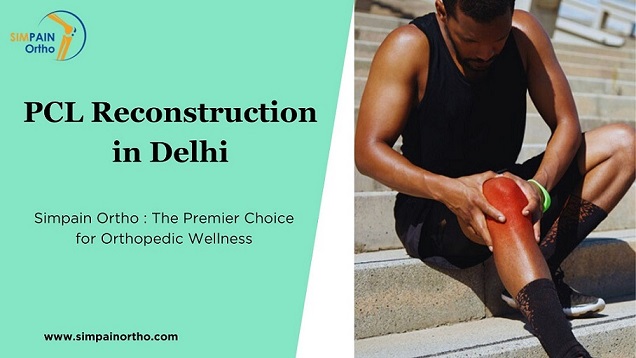
Do you experience pain behind your knees? It could be a sign of a PCL tear or strain.
Posterior Cruciate Ligament Importance
The posterior cruciate ligament, or the PCL, is a ligament located at the back or middle of the knee. It is one of the ligaments which connects the femur (thighbone) to the tibia (shinbone). The posterior cruciate ligament is one of the most vital ligaments of the knee, and it gets injured less often for about 3-37% of all knee injuries. Posterior cruciate ligament tears can cause several problems, such as difficulty climbing stairs, problems with deceleration and pain over the anterior aspect of the knee.
This blog has been drafted to detail PCL injuries, their causes, symptoms, and effective treatment options. To make this post informative for readers, we have taken insights from the orthopedic doctors at Simpain Ortho, who specialize in performing PCL reconstruction in Delhi. Continue reading for detailed insights.
What are PCL Injuries?
PCL injuries are more challenging to detect than other knee injuries. Other surgeries can occur in combination with PCL injuries, such as cartilage injuries, bone bruises, and ligament injuries. PCL injuries can be graded as I, II or III (depending on the severity of the injury). The knee joint is stable in grade I despite the ligament having little injury and stretching. There is a partial ligament tear in grade II. However, in grade III, the ligament is completely torn, dividing it into two halves, which makes the knee joints weak.
What are the Causes of PCL Injuries?
The PCL is injured due to a direct impact, such as in an automobile accident when the bent knee strikes the dashboard. In sports, it can occur if an athlete falls to the ground with a bent knee. Moreover, twisting or overextending the knee can cause PCL to wear.
What are the Symptoms of PCL Injuries?
Patients suffering from PCL injuries can experience knee pain and swelling immediately post-surgery. They could also face instability in the knee joint and stiffness, which leads to difficulty walking.
How are PCL Injuries Treated?
The treatment options for PCL injuries include non-surgical and surgical treatment. The non-surgical options include rest, ice, compression, etc. They help in controlling pain and swelling. Physical therapy could be recommended to improve knee motion and strength. Moreover, doctors also advise a knee brace to immobilize your knee. However, the surgical options include PCL reconstruction. In this surgery, the grafts are taken from the patient’s body and placed in a position where the original PCL was present. The graft is then fixed with the help of fixation devices.
Final Takeaway
If you are experiencing symptoms of PCL injuries, immediately seek help from an Orthopedic Doctor in Delhi who can perform a complete diagnosis and provide effective treatments.
You can consult the expert orthopedic surgeons at Simpain Ortho, who treat PCL injuries with the help of crutches, using knee braces, ice packing of the knee joint, and also perform promising and best PCL reconstruction surgery (depending on the grade of severity).
Consult expert orthopedic doctors for any type of knee injury diagnosis and treatment, at Simpain Ortho for more details.


